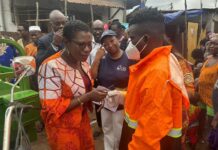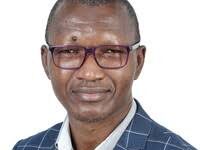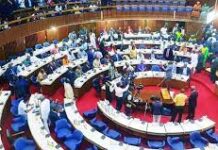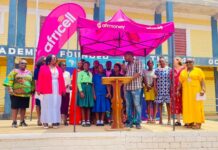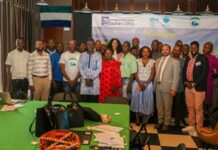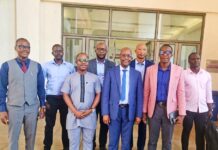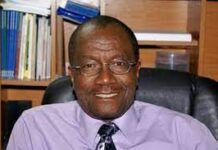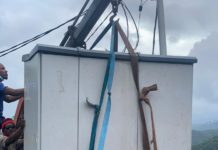Fumi Jones
The National Aids Secretariat (NAS) in Sierra Leone headed by Dr. Abdul Rahman Sessay has called for the establishment of a special Equity Court that will address cases of stigma and discrimination associated with HIV-Aids.
The call was made in collaboration with UNAIDS, Jhpiego, AHF, Christian Aid, and the UNDP, through the Judiciary of Sierra Leone, at a two-day residential consultation engagements in Makeni, Bombali District with Judges, Magistrates and other senior Judiciary staff.
As per the program activities, the team was taken on a moonlight tour at hotspot areas of key populations, and also made visitations to the Drop- In- Centres (DCI) at Rofutha Development Association (RODA), the support group centre of the Network of HIV Positives in Sierra Leone (NETHIPS) and Happy Kids and Adolescent Home.
In his opening remarks, the Director General of NAS, Dr.Abdul Rahman Sessay welcomed the Judiciary team headed by a Supreme Court Judge, Justice Ekundayo Roberts who noted that the consultation engagements is an epoch making event which should be followed up to see how the partnership with the Judiciary can grow.
It is also a learning process for the Judiciary team to see the challenges and the reality on the ground with the key populations group including sex workers.
According to Dr.Sesay, NAS as coordinator to all partners is in the region due to the Chief Justice, Desmond Babatunde Edwardscommitment with NAS at a prior meeting, where he suggested for an engagement with resident Judges and Magistrates so that they can benefit from each others experience.
The engagement of Judicial Officers, Dr. Abdul Rahman Sesay said, is not only aimed at establishing a Special Court, but also help to fast track the enforcement of the law through the prosecution of those stigmatizing persons living with HIV-AIDS in Sierra Leone.
He thanked the Chief Justice Desmond Babatunde Edwards and Judges for their commitment and remarkable support to the entire process; and for prioritising the two- day residential engagements in the Northern region of Sierra Leone.
It also gives a clear picture to the challenges of key populations and other vulnerable sex population face with in their various communities, and the stagma associated with living with HIV/Aids.
In his presentation, the UNAIDS Country Director, Dr. Isaac Ahemesah revealed the prevalence rate of HIV and Aids among targeted populations group, and the challenges with regards to human rights violations that is leading to the constraints to reach them because of the stigma and discrimination faced.
On the issue of arrest of sex workers for loitery offence, Dr. Ahemesah said the law enforcers, including the Police applied the law based on the status in society.
“And our mission is to join the world to end HIV-AIDS by 2030, and Sierra Leone will not be left behind.” Dr. Isacc Ahemesah emphasised.
How do we ensure that the rights of these sex workers are protected so that they feel confident enough, and when they are beaten up, they can be confident to go to the police and report because somebody has violated them? This is a questioned posed by Dr. Isaac Ahemesah to the audience.
Sex workers or regular person, can take medication to virally suppressed the virus, and for it not be transmitted; and the number of people on treatment, Dr. Ahemesah said, has moved from 46 thousand in 2021, and presently, we have 61 thousand on medication.
“Putting everyone on treatment can lead everyone to go to sleep, but people are not going for tests because of stigma and discrimination and all we have to do is to test the 76 thousand people in Sierra Leone,” Dr. Isaac Ahemesah assured.
He went on that, in terms of deaths and because we have increased in the number of treatments, the number of people dying of HIV is also reducing because the more we put people into medication, the less likely they will die.
Unfortunately, Dr. Isacc said most of these ones that died are children below four years, and the reasons, he said are not justifiable in any way, as there is no reason why a baby should die of HIV, but the mothers don`t go to hospital or clinic when pregnant’.
According Dr.Godswill Agada of Jhpiego, Sierra Leone has actually thought it wise to focus specifcally on this group of key populations to provide services with a view to reducing, preventing them from the number people that have the infection so that they cannot transmit it.
He said there is a lot of programs put in measure; firstly the HIV-AIDS Information Prevention, Education and Communication that are specialised and tailored by their own members who are also key population that were trained to provide the services.
In reducing HIV-AIDS in this broad population, Dr. Agada highlighted two key approaches, firstly those who are HIV positive must be look for; approach them and put them in life saving medication that will within 3 to 6 months, their virus is suppressed and once suppressed, transmition became very limited. And for those negative, “we have drugs that they can take and never acquire the infection,” Dr. Agada re-assured.
He went on that 60% of forty thousand Men Sex Men (MSM) are people of biosexual.
Jhpiego team leader, Dr. Basil Uguge, said HIV is a very friendy virus and can be much more better than diabitis and hypathiases as long the medication is taken. ” We now have a window of how we can end it, if only we put the 76 thousand people on treatment, we will likely not find new infection, and study has shown that if people take treatemt properly, their life expectancy is the same with people who have HIV -AIDS,” Dr. Basil stressed.
The problem, Dr. Basil Uguge said is the quality of the care, and the challenged of quality of care are some of this structural issues we want to address, which includes discrimination; and this issue surrounding it is very important to have a robust program which is why the engagement is key for us to win and break the barriers so that we can increase access and improve the quality of life.
Stigma at work place, Dr. Basil said, is where we want the Judiciary to help fix those areas so that we can improve the response, and “if we don`t do that, we will have a lot of problems.”
Justice Ekundayo Robert called to know more about HIV-AIDS for personal hygiene. He added, “We have the responsibility to make a conscious effort to have a court design, looking for best practice from other jurisdiction.”
It is said that out of the seventy eight thousand people who are infected, the prevalence among boys is 0.5% and girls is about 1.5%, and most of them are in secondary schools, and the lack of sex information from parents has increased their vulnerability. And Sierra Leone is ranked 18 among list of countries with highest cases of child marriage.
HIV epidemic prevalence is 11.8% among sex workers, and 30% of the sex workers population are below the age of 18 years, and 106 thousand women spread across the country are practicing sex work actively.
The infection, according to various speakers is going on even in the prisons and Bo and Kenema are reported to have the highest prevalence with more children getting infected.
Another challenge has to do with the issue of clearing containers of medical drugs at the Port, and Police taking bribes in cash or sex in kind, which according to them is said to be the norm.




